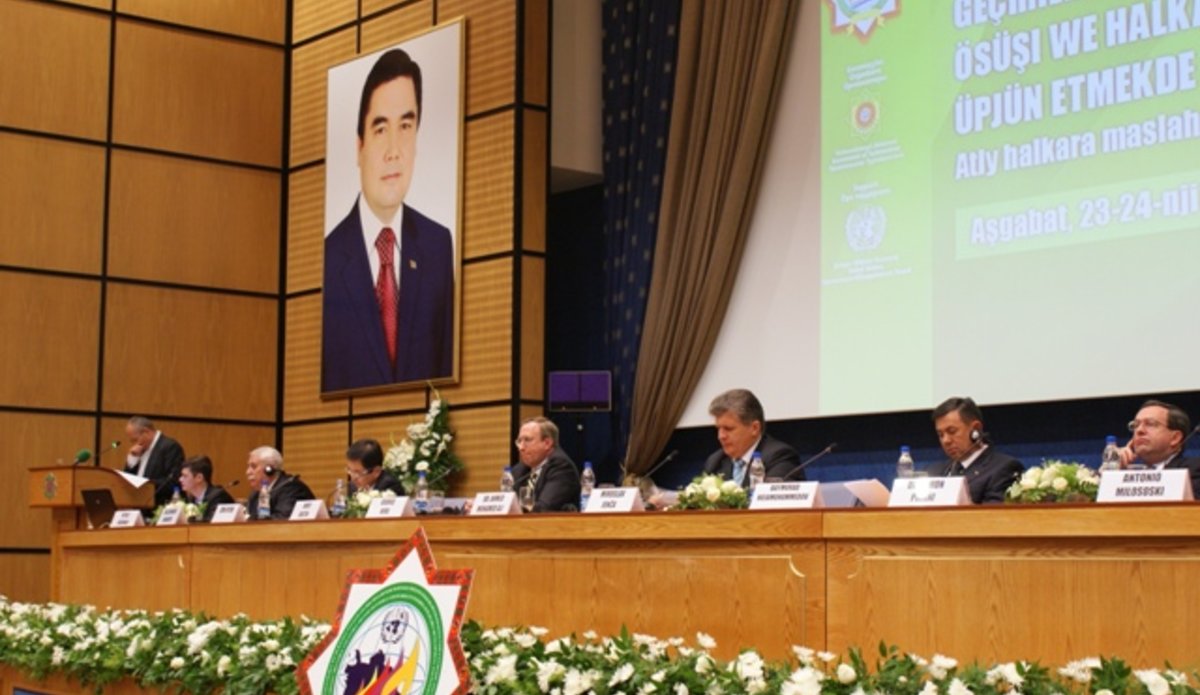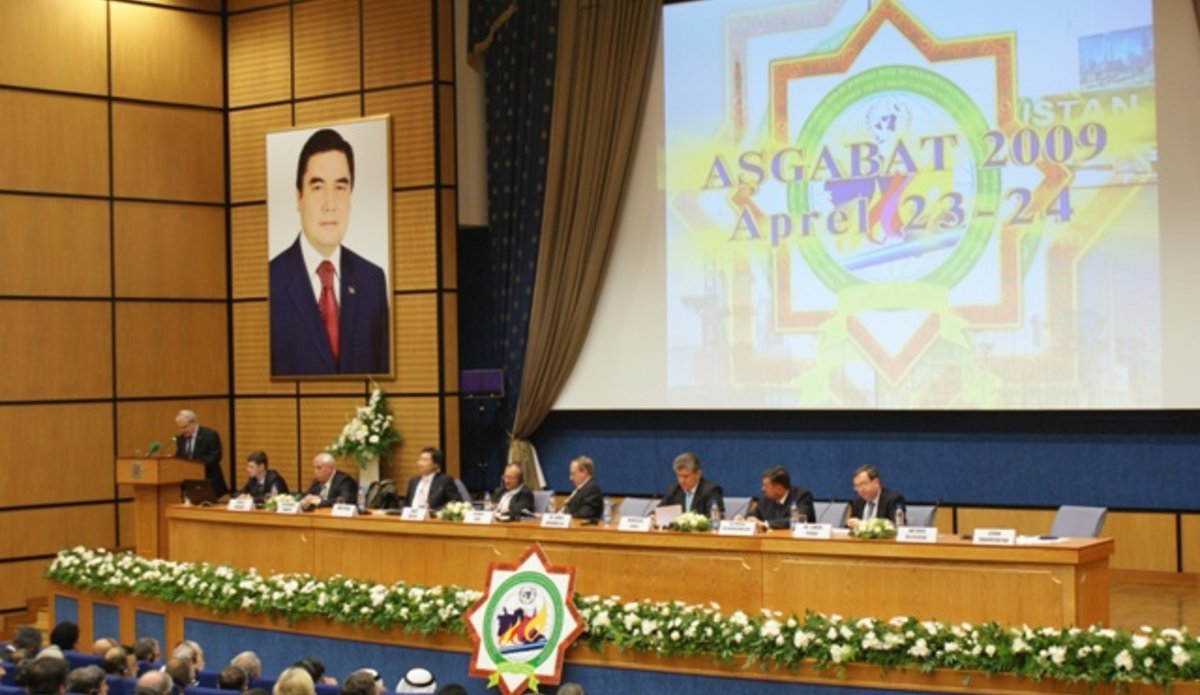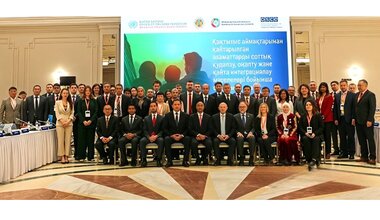SRSG Miroslav Jenča’s speech at the International Conference on “Reliable and Stable Transit of Energy for Sustainable Development and International Cooperation”
ASHGABAT, Turkmenistan
Dear Mr. Chairman, Ladies and Gentlemen,
The United Nations Regional Center for Preventive Diplomacy for Central Asia (UNRCCA) is very pleased to participate in this international conference on reliable and stable transit of energy for sustainable development and international cooperation. On this occasion, I would like to express our sincere appreciation for the excellent organization of this high-level event for which the host country deserves high praise.
Allow me to briefly introduce our Centre and its role. The UNRCCA was established in Ashgabat and began its work in June 2008 based on a consensus between five Central Asian countries: Kazakhstan, Kyrgyzstan, Tajikistan, Turkmenistan and Uzbekistan. The UNRCCA is mandated to strengthen cooperative security partnerships between the five countries, regional and international organizations in order to facilitate joint solutions to shared challenges in the Region. The main tool of the UNRCCA is preventive diplomacy. This means that the Centre acts as a neutral facilitator and a mechanism for preventive mediation, fostering dialogue and cooperation in support of peacemaking efforts and stability in Central Asia.
This two-day international conference has particular relevance for regional cooperation in Central Asia. Energy in all its forms is present in the Region. However, although the needs are the same, natural distribution of energy resources is unequal. In order for energy to become the factor that binds rather than a source of tension and dispute, it is important that an understanding be reached among the countries of the Region about instruments and mechanisms, which would guarantee each and every one of them the right to a peaceful enjoyment of basic but vital needs in gas, water, heating or electricity.
The UNRCCA recognizes the importance of energy security for sustainable development. Its Programme of Action, prepared in consultation with the five Governments of the Region, identifies three key priorities:
- Facilitating and supporting regional cooperation to counter cross-border threats such as terrorism, extremism, organized crime and drug-trafficking;
- Promoting dialogue and consultation between the countries of the Region in order to reach a long-term agreement about the modalities of an inclusive management of essential common resources, such as water and energy, which would be beneficial to all;
- Supporting the efforts to stabilize Afghanistan.
The sector of water and energy was defined as a priority area because it is critically important for the development needs of Central Asia and long-term stability. A few days ago, the UNRCCA supported by the United Nations Economic Commission for Europe (UNECE) conducted a seminar in Almaty on "International Water Law and the Negotiation of Mutually Beneficial Multilateral Water Agreements in Central Asia". The purpose of this event was to facilitate the search for a common approach to water resources management issues in Central Asia by creating a dynamic that would pave the way for sustainable, long-term solutions. The seminar provided a forum of discussion about water problems where representatives of upstream and downstream countries in the Central Asian Region and international experts could share best practices in negotiating successful trans-boundary water agreements in light of existing international water conventions and interstate agreements. Follow up events are planned, but more importantly, a consultative process was launched.
Our Centre is committed to securing and maintaining direct and regular contact with and between Central Asian countries to pave the way for a negotiated solution to the multifaceted challenges that face the Region, including energy-related challenges. It is critical to the success of any endeavor that the legitimate interests of all, and the problems they are confronted with, are exposed and discussed openly. Achieving reliable and stable energy supplies will only be possible if the needs of all in the supply chain are taken into consideration. Exporters, consumers and transit countries alike have a vested interest in reliable cooperative frameworks. There is a common understanding within Central Asia of the need for a strong regional regime of energy resources management with proper consideration of the interests of all Central Asian countries. What is needed for such an understanding to become a reality is political will that will lead to a mutually beneficial political agreement.
This conference is an ideal opportunity to take stock of the growing role of the transit of energy in global processes. Defining common and transparent energy trade rules, through bilateral and multilateral agreements, would not only strengthen energy security and facilitate enhanced cooperation in the rational use of energy resources; it would also improve economic prospects in the Region and create the conditions for the elaboration of long-term sustainable development strategies.
The UNRCCA has been and will continue facilitating contacts between all the stakeholders involved in discussions relating to energy problems in Central Asia. It will offer its good offices, respond to requests, and provide a platform for regular exchanges. By fostering consultations and discussions in a variety of formats, the UNRCCA hopes to build a momentum for a locally-driven process, which will result in negotiated arrangements and strengthen security and stability in the Region.
To conclude, I would like to mention that today's conference has evidently stimulated a lot of genuine interest and will offer significant food for thought. The UNRCCA, and the UN system as a whole, will continue promoting and calling for concerted efforts in the twin areas of energy and development in order to reach common understanding about the elements and processes leading to durable, fair and equitable solutions for all.
Thank you.
 UN
UN








